Building back a better normal through sustainable tourism
November 2020
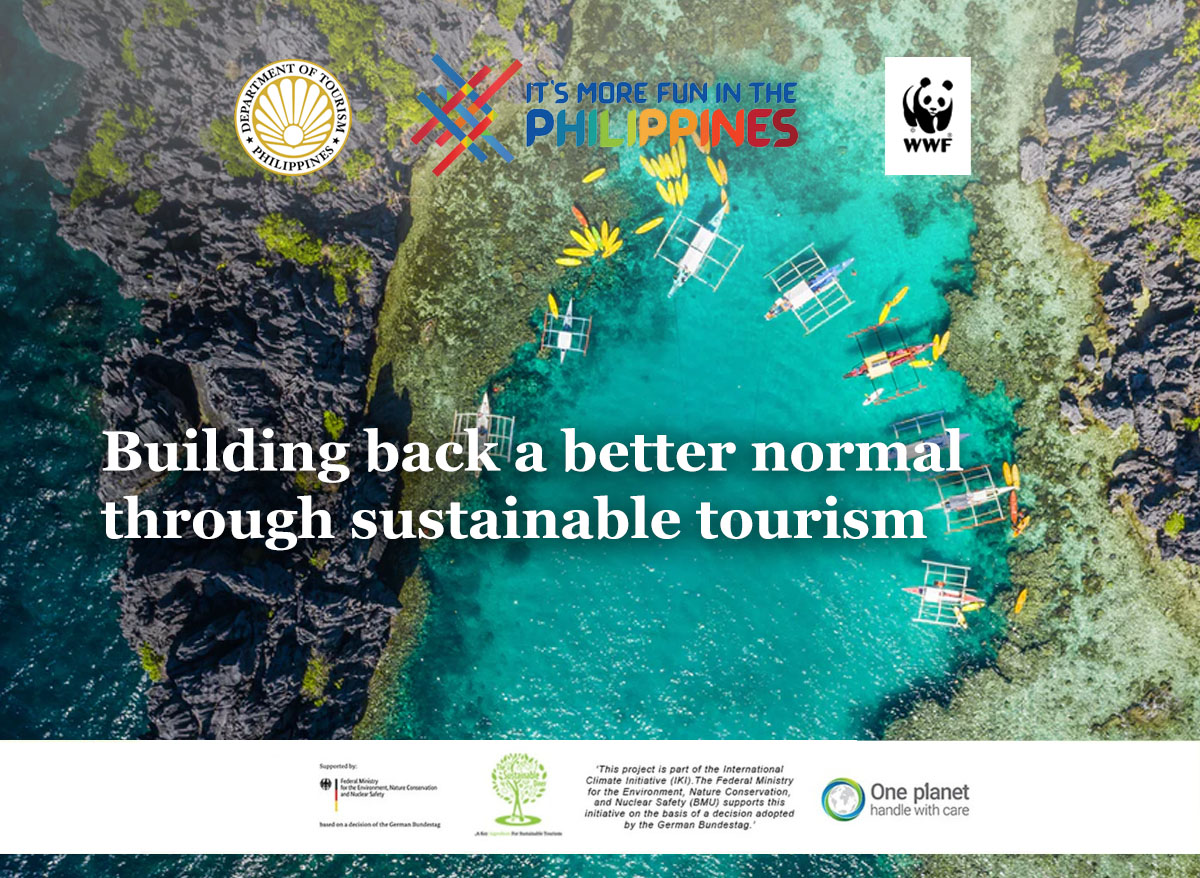
The COVID-19 pandemic has surely drastically changed how the world works. In an effort to manage the number of cases, movement has been restricted. The tourism industry is greatly affected by this restriction since it is highly dependent on the movement of travelers. It is also human nature to adapt and find innovative ways to thrive.
The World Wide Fund for Nature (WWF) Philippines was tapped by the Department of Tourism (DOT) to hold a series of online webinars about Sustainable Tourism for DOT accredited establishments. The first of these webinars was held last October 15, 2020. The webinar on Sustainable Tourism for a Better Normal, hosted by WWF-Philippines Ambassador Mikee Cojuangco-Jaworski, aimed to educate the food service and hospitality establishments on species conservation, water management, and food waste management.
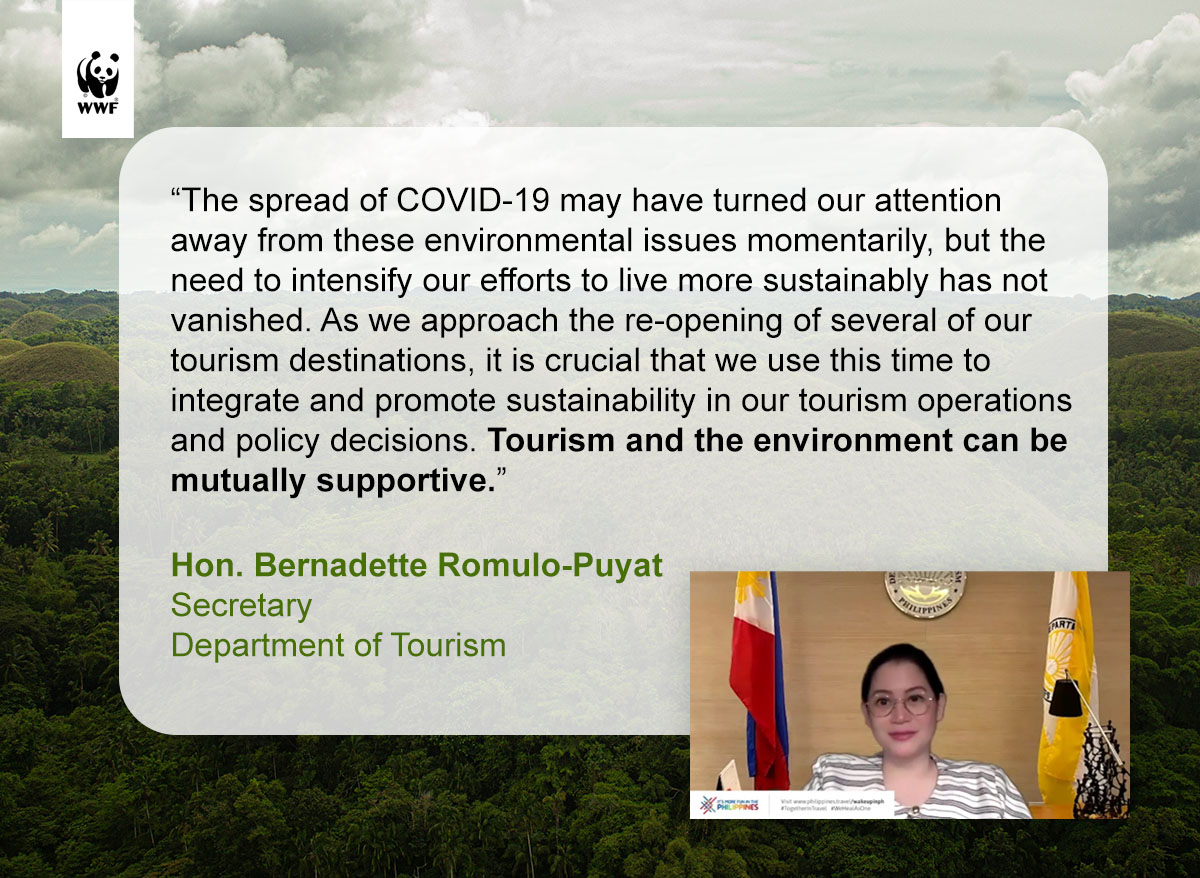
Secretary of the Department of Tourism, Hon. Bernadette Romulo-Puyat, welcomed the participants. She noted that “The spread of Covid-19 may have turned our attention away from these environmental issues momentarily, but the need to intensify our efforts to live more sustainably has not vanished. As we approach the re-opening of several of our tourism destinations, it is crucial that we use this time to integrate and promote sustainability in our tourism operations and policy decisions. Tourism and the environment can be mutually supportive.”
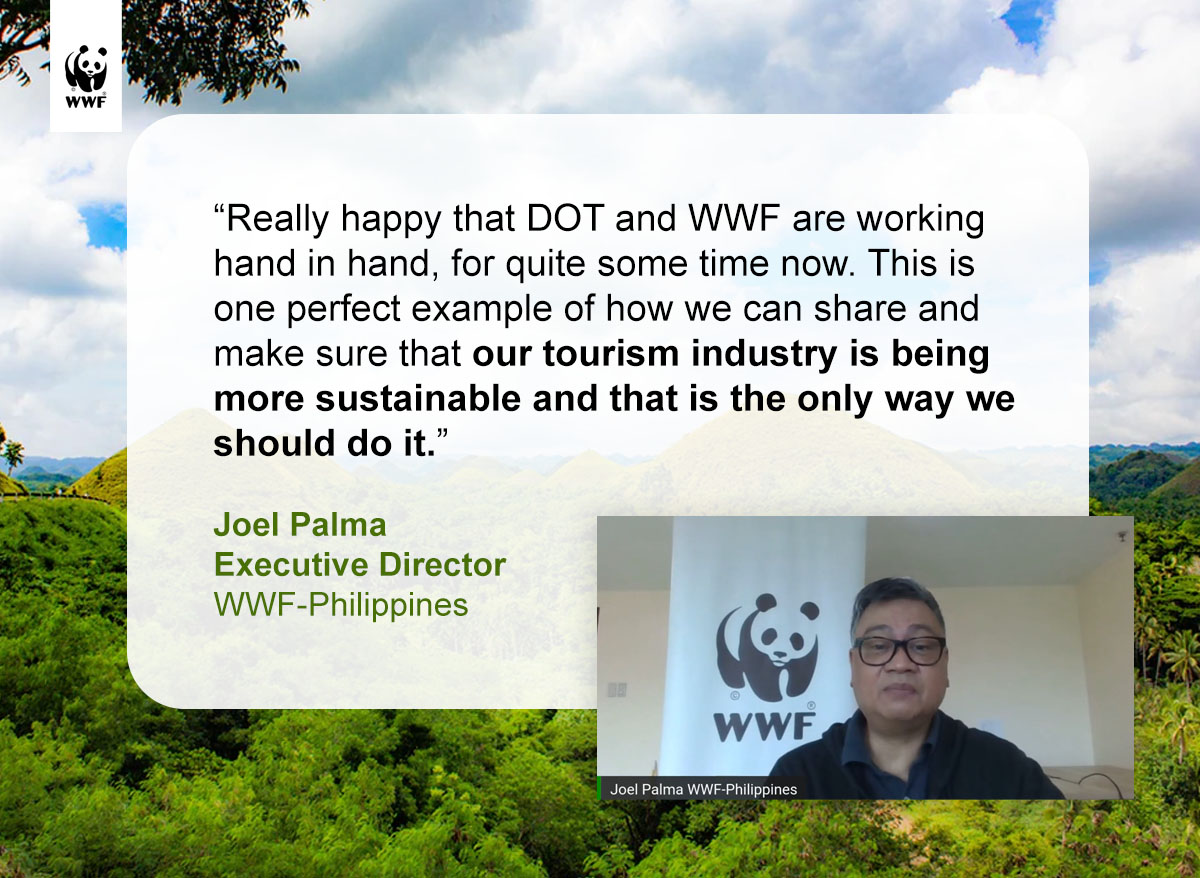
WWF Executive Director, Joel Palma, also shared insights on sustainable tourism. “Really happy that DOT and WWF are working hand in hand, for quite some time now. This is one perfect example of how we can share and make sure that our tourism industry is being more sustainable and that is the only way we should do it.”
The Philippines is blessed with megadiverse flora and fauna, and this is one of the reasons why it is a top tourist destination. Species conservation, the first topic of the webinar, is essential in achieving sustainable tourism. Maye Padilla, WWF-Philippines’ Environmental Education Officer, talked about the seven (7) Leave No Trace principles (LNP) and the impacts of garbage on the environment, wildlife, and consequently to the tourism industry. Tourism establishments were encouraged to provide avenues for tourists where they can dispose of their garbage properly and interact with nature and wildlife responsibly. Jonna Jacinto, who also serves as an Environmental Education Officer for the organization, educated the audience about the different wildlife species that can be found in different tourism destinations in the country. The respective behavior of wildlife species was discussed to encourage tourism establishments to promote responsible interaction.
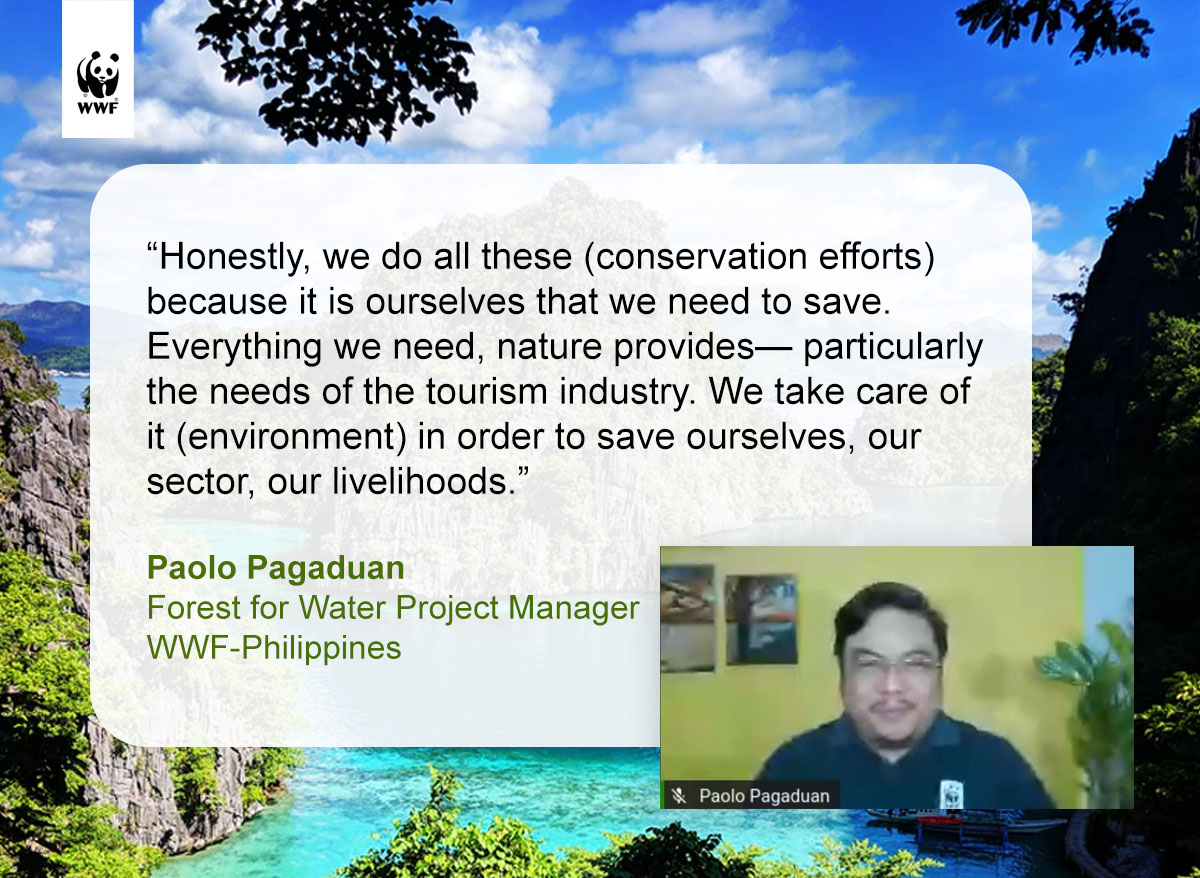
Paolo Pagaduan, WWF-Philippines’ Forest for Water Project Manager, spoke on the second topic--importance of water management in tourism facilities. The presence of clean flowing water is really important, especially during this pandemic, when frequent hand washing is encouraged. In addition, clean fresh water is important for drinking purposes especially for the hospitality and food service industry. Pagaduan emphasized that it is important to process water after use and before releasing it back to the environment, and shared tips like dual piping for commercial and industrial facilities. The Water Risk Filter tool was also shared to help tourism establishments assess their water needs and address water conservation targets.
Pagaduan reminded the audience why we need to conserve water and nature. “Sa totoo lang ginagawa natin lahat ‘yan (conservation efforts) kasi kailangan natin i-save yung sarili natin dahil lahat ng kailangan natin ay nanggaling sa kalikasan. Partikular ‘yong industriya ng turismo. Kaya natin inaalagaan ito ay para iligtas ang ating sarili, iligtas ang ating sektor, iligtas ang ating hanap buhay,” said Pagaduan.
(Pagaduan reminded the audience why we need to conserve water and nature. “Honestly, we do all these (conservation efforts) because it is ourselves that we need to save. Everything we need, nature provides-- particularly the needs of the tourism industry. We take care of it (environment) in order to save ourselves, our sector, our livelihoods.” said Pagaduan)
The last part of the webinar was about food waste management. Iris Abrigo, Sustainable Business Officer of The Sustainable Diner Project, explained the social and environmental impacts of improper disposal of food waste. Tourism establishments were encouraged to prevent food waste, donate safe, edible and wholesome food surplus, and to divert inevitable food waste from landfills through composting.
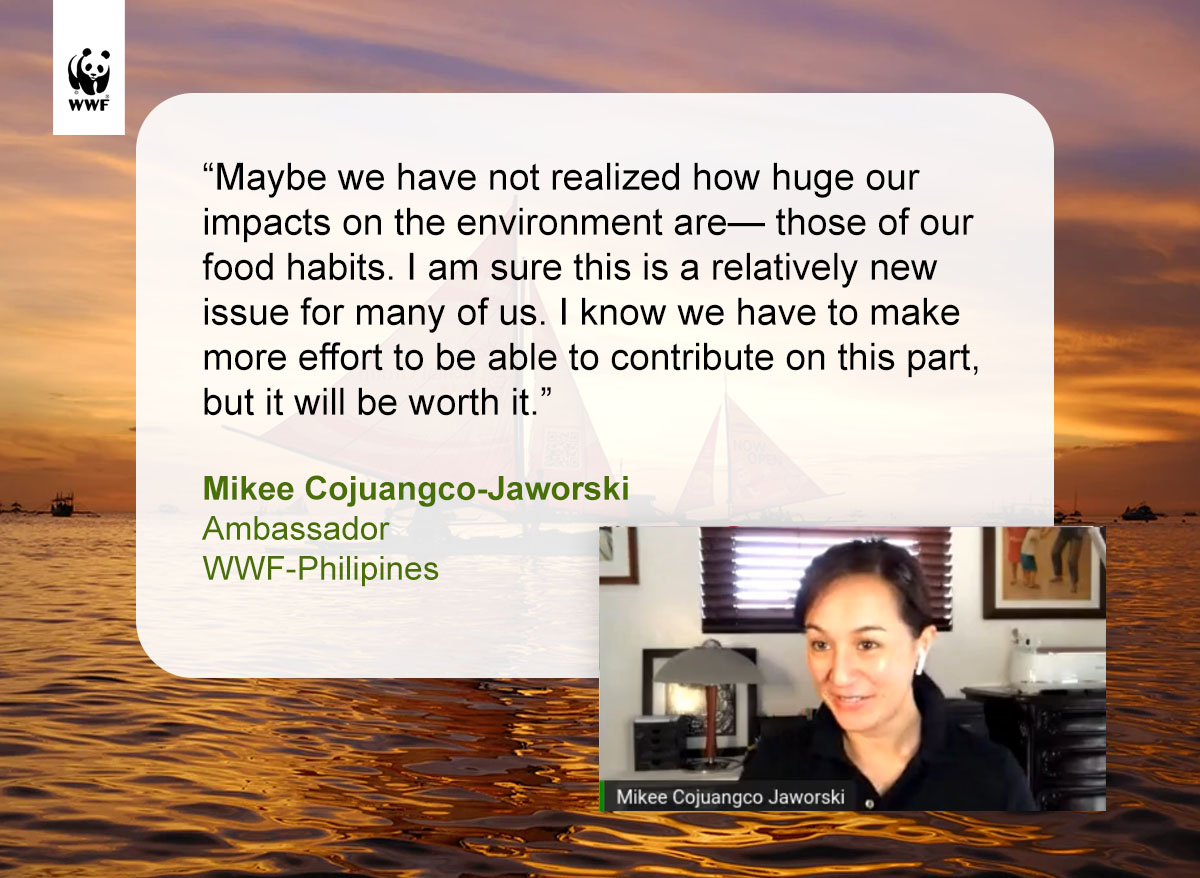
After the food waste management presentation, Mikee Cojuangco-Jaworski commented, “Siguro hindi natin narealize na gano’n pala kalaki yung epekto natin, ng mga food habits natin. Medyo bago ‘yong usapin na ‘to, I’m sure para sa marami sa atin. Alam ko we have to make more effort to be able to contribute on this part, pero magiging worth it naman.”
(After the food waste management presentation, Mikee Cojuangco-Jaworski commented, “Maybe we have not realized how huge our impacts on the environment are--those of our food habits. I am sure this is a relatively new issue for many of us. I know we have to make more effort to be able to contribute on this part, but it will be worth it.”)
This pandemic forced us to rethink our existing practices and embrace new ways to still have both an environmentally and economically sustainable tourism industry. As Padilla shared, “Nature is not a destination, nature is our home...Nature is all around us…We must also remember na tayo, tayo ay bahagi ng kalikasan (that we ourselves are part of nature).”
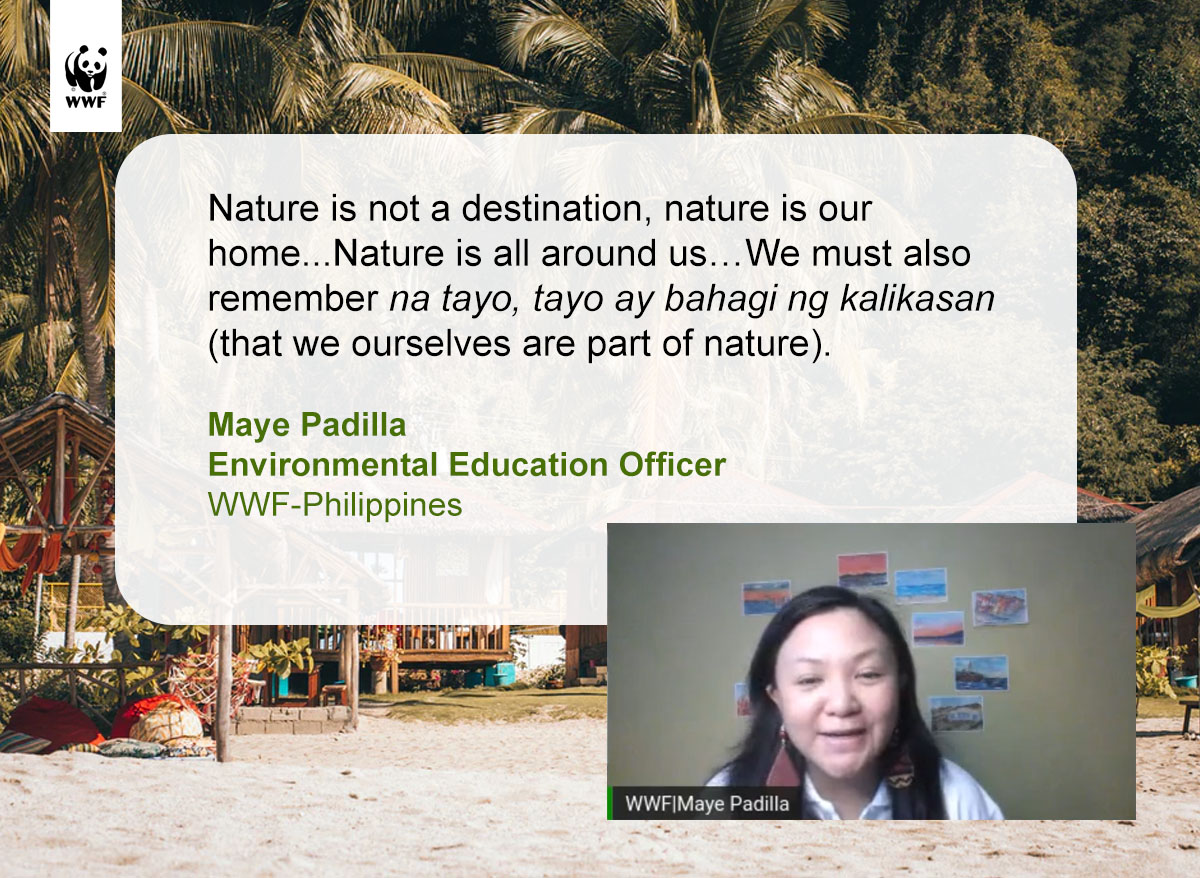
Participants were encouraged to visit the WWF website if they have further questions. To learn more about future events and initiatives, visit the following Facebook pages: WWF-Philippines and Department of Tourism - Philippines.
The Sustainable Diner project, under Sustainable Consumption and Production, is part of the International Climate Initiative (IKI). The Federal Ministry for the Environment, Nature Conservation, and Nuclear Safety (BMU) supports this initiative on the basis of a decision adopted by the German Bundestag.
The Sustainable Diner Project Team:
Melody Melo-Rijk, Jonna Ellaine Jordan, Lorayne Therese Roque, Alexa Jeanne Lasch, Iris Joy Abrigo, Liezl Stuart del Rosario, Kristan Gabriel Villalon, Jenette Callada
Design by Jonna Jordan, Gabriel Villalon
For more information, please contact:
Melody Melo-Rijk
Sustainable Diner Project Manager
mmelorijk@wwf.org.ph
Jonna Ellaine Jordan
Integrated Marketing Communication Specialist
jjordan@wwf.org.ph
Liezl Stuart del Rosario
Policy Specialist
lstuartdelrosario@wwf.org.ph
Iris Joy Abrigo
Sustainable Business Officer
iabrigo@wwf.org.ph
